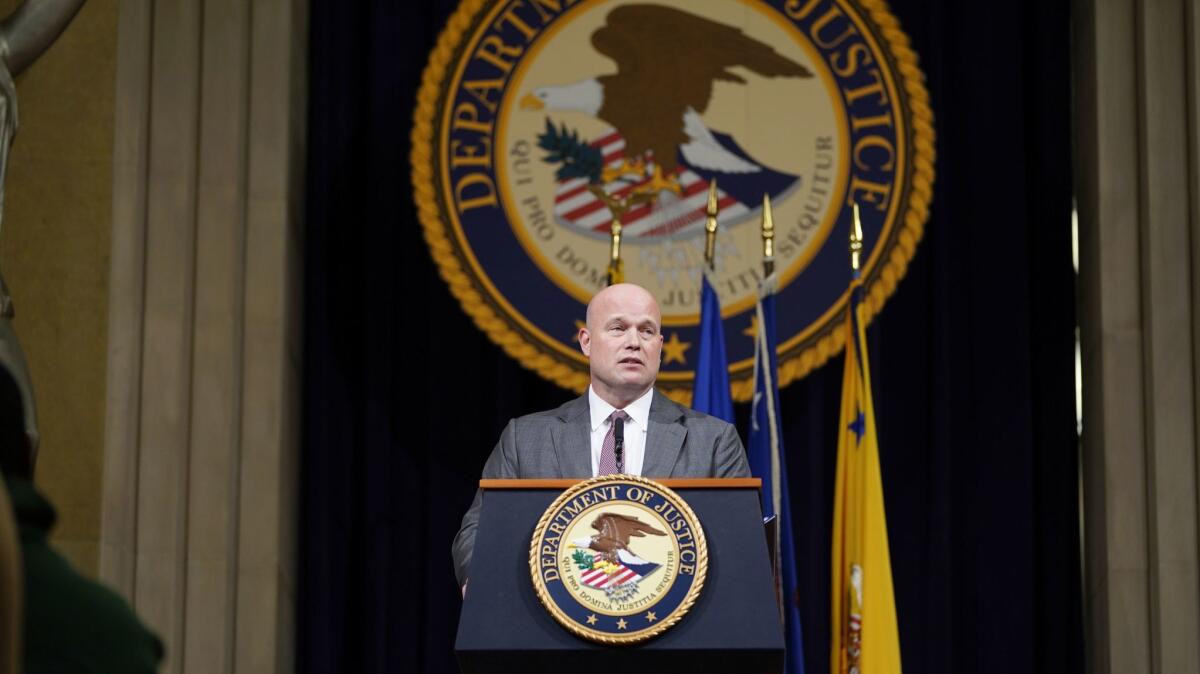Editorial: Find a permanent replacement for Matthew Whitaker and do it fast

- Share via
Alarm bells understandably rang earlier this month when Matthew G. Whitaker, the chief of staff to fired Atty. Gen. Jeff Sessions, leapfrogged over more senior — and Senate-confirmed — Justice Department officials to become President Trump’s acting attorney general.
It’s hard to imagine a less reassuring replacement. As a commentator, Whitaker (a former U.S. attorney in Iowa) had questioned the investigation conducted by Special Counsel Robert S. Mueller III and even suggested that Mueller’s appointment smelled “a little fishy.” Yet as acting attorney general, Whitaker is positioned to be the ultimate overseer of an investigation that, among other matters, is looking into whether Trump’s 2016 campaign illegally colluded with Russia.
Even more ominously, Trump seems to be in no rush to nominate a new attorney general. Meanwhile, he said over the weekend that he “would not get involved” if Whitaker moved to curtail Mueller’s investigation. That’s hardly surprising, given that Trump has described the probe as an illegal “witch hunt.”
Trump’s latest comments underline the importance of enacting legislation to protect Mueller.
Trump’s latest comments underline the importance of enacting legislation to protect Mueller, which Senate Majority Leader Mitch McConnell (R-Ky.) perversely has refused to advance despite its bipartisan backing. The Special Counsel Independence and Integrity Act approved by the Senate Judiciary Committee in April would codify a Justice Department rule that special counsels can be fired only for good cause and would allow a counsel to appeal his or her dismissal in court. It needs to be enacted.
But Trump’s comments, including his praise for Whitaker, point to another problem: By elevating Whitaker, who is not a Senate-confirmed official, the president is violating the spirit and possibly the letter of the Constitution’s Appointments Clause. In a lawsuit filed on Monday, three Democratic U.S. senators — Richard Blumenthal of Connecticut, Mazie K. Hirono of Hawaii and Sheldon Whitehouse of Rhode Island — claim that Whitaker’s appointment flouts not only the Constitution but also a statute setting out a line of succession for the Justice Department.
Installing a staffer like Whitaker as acting attorney general would be troubling under any circumstances. But with the president’s own conduct being scrutinized by Mueller, it’s vital that an official confirmed by the Senate have oversight over the probe.
Because Sessions rightly had recused himself from the Russia investigation in light of his role in the 2016 Trump campaign, that oversight had been provided by Session’s Senate-confirmed deputy, Rod Rosenstein, who appointed Mueller. But with Sessions’ forced resignation, that authority passes to Whitaker. You don’t have to endorse Whitehouse’s description of Whitaker as a “lackey” to be troubled by entrusting responsibility for the Mueller investigation to him.
Sen. Lindsey Graham (R-S.C.), who is expected to chair the Senate Judiciary Committee in the new Congress, blithely declared the he didn’t see “any indication at all” that Trump or Whitaker will interfere with Mueller’s investigation, which apparently has reached a crucial point with Trump answering written questions posed by the special counsel.
Enter the Fray: First takes on the news of the minute from L.A. Times Opinion »
Pardon us if we’re not reassured. Trump has continually raged against the special counsel’s investigation, even after it resulted in indictments and guilty pleas. The fact that Sessions’ recusal led to Mueller’s appointment prompted the president to humiliate and eventually fire a man who was a key supporter during the campaign and who as attorney general faithfully executed the president’s policies.
Whatever one thought of Sessions’ policy views — and we opposed most of them — his decision to recuse himself from investigations connected to the 2016 campaign was admirable. And it flowed from the fact that, as Sessions noted in his recusal statement, he had assured the Senate Judiciary Committee that “if a specific matter arose where I believed my impartiality might reasonably be questioned, I would consult with Department ethics officials regarding the most appropriate way to proceed.” Such assurances are an important part of the Senate confirmation process.
Trump must expeditiously identify a new nominee for attorney general who can be questioned by the Senate early in the new year about his or her professionalism and integrity. That nominee also should be required, as a condition of confirmation, to promise not to allow political considerations to influence the administration of justice. In the meantime, where the Mueller investigation is concerned, Whitaker — assuming he doesn’t recuse himself, which seems unlikely — must show appropriate deference to the judgment of the professionals who have been pursuing this matter since long before his inappropriate elevation.
Follow the Opinion section on Twitter @latimesopinion and Facebook
More to Read
A cure for the common opinion
Get thought-provoking perspectives with our weekly newsletter.
You may occasionally receive promotional content from the Los Angeles Times.









